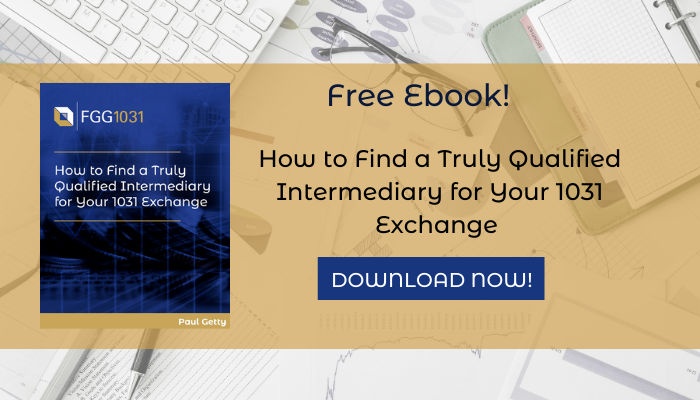The IRS makes it clear that a 1031 exchange requires a Qualified Intermediary (QI), but understanding the role of the QI and why you need one can be a source of confusion.
A QI is a facilitator, representing the real estate investor and essentially acting as the glue that keeps the 1031 exchange from falling apart. The QI also is a partner, sounding board, organizer, and more, making sure deadlines are met, records are kept, and money is secured and properly transferred per IRS rules.
In a 1031 exchange, one real estate investment, which may include multiple properties, is sold and the proceeds are used to purchase a like-kind replacement property of equal or greater value, enabling the investor to defer capital gains and depreciation taxes. Replacement properties must be identified within 45 days of the sale of the original investment and must be closed upon within 180 days of the sale date.
Securing the Funds from Sale of the Initial Property
The QI is involved in almost every step of the process, but the QI’s first order of business is to handle the proceeds from the sale of the relinquished property pending the completion of the exchange.
The key for the investor is never taking possession of cash or other proceeds from the sale of the relinquished property, which would cause a taxable event and void the 1031 exchange. Instead, the QI is responsible for what is often a large sum of the investor’s money, which is why it is imperative to find a reputable, experienced person for the job.
The irs.gov website warns that there have been cases of QIs committing fraud or failing to safeguard investor money, and while those cases are not commonplace, the QI can make the difference between the success and failure of the 1031 exchange.
When interviewing potential QIs always ask where the relinquished property sale proceeds will be placed. While FDIC insurance likely will not be enough to cover the total amount, knowing the funds are being held in a trust at a reputable bank will bring peace of mind.
Identifying and Recording Replacement Property Options
The investor has only 45 days to identify up to three potential replacement properties. Additional properties can be identified as long as the value doesn’t exceed 200% of the relinquished property or the investor plans to close on more than 95% of the total value of the identified replacement properties.
The QI must document each of the identified potential replacement properties with the defining characteristics such as street address, distinguishable name, and/or legal description. Unit numbers should also be recorded if appropriate, otherwise it could signal intention to purchase the entire property.
Added information is required if the exchange involves a DST including ownership percentage and related equity and debt figures. QI’s also may have differing policies about changing investment amounts between identified properties after the 45-day ID period which should be provided to the investor upon request.
If the investor determines a potential replacement property is no longer a good fit e.g., it is purchased by another party, or a different replacement property is identified, the investor must notify the QI before the 45-day deadline and the QI records the changes.
Wrapping Up the 1031 Exchange
As the final property or properties go under contract, the QI instructs the escrow agent about how to disburse the funds at closing and provides documents to transfer the replacement to the investor.
In the case of a partial 1031 exchange in which the investor ultimately reinvests only a portion of the relinquished property proceeds and takes possession of the remaining cash, the QI distributes those funds to the investor.
The QI plays a critical role in nearly every facet of a 1031 exchange. An experienced, detail-oriented QI can help make the entire process go smoothly while avoiding missteps that can nullify the exchange, such as missing a deadline during the process or failing to properly complete paperwork that might be uncovered years later during an audit.
QIs and Tax Matters
It is important to note that the QI cannot be the tax advisor to the client and that responsibility for tax advice is the role of the client’s tax advisor. QIs can describe general rules for exchanges in a similar capacity to acting as a teacher to a student, but the client must do their homework on their personal cases with their tax advisor.
Ultimately, the QI helps the investor successfully complete the 1031 exchange.
For an in-depth look at the QI role and how to find one that will fit your objectives, download our eBook How to Find a Truly Qualified Intermediary for Your 1031 Exchange, available now!









Your Comments :